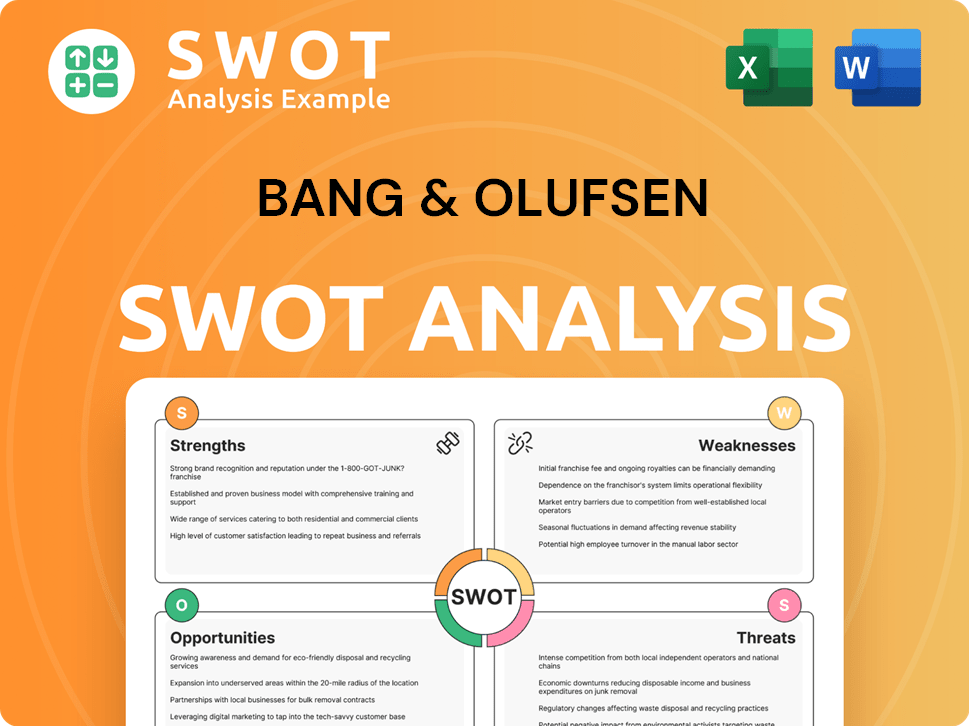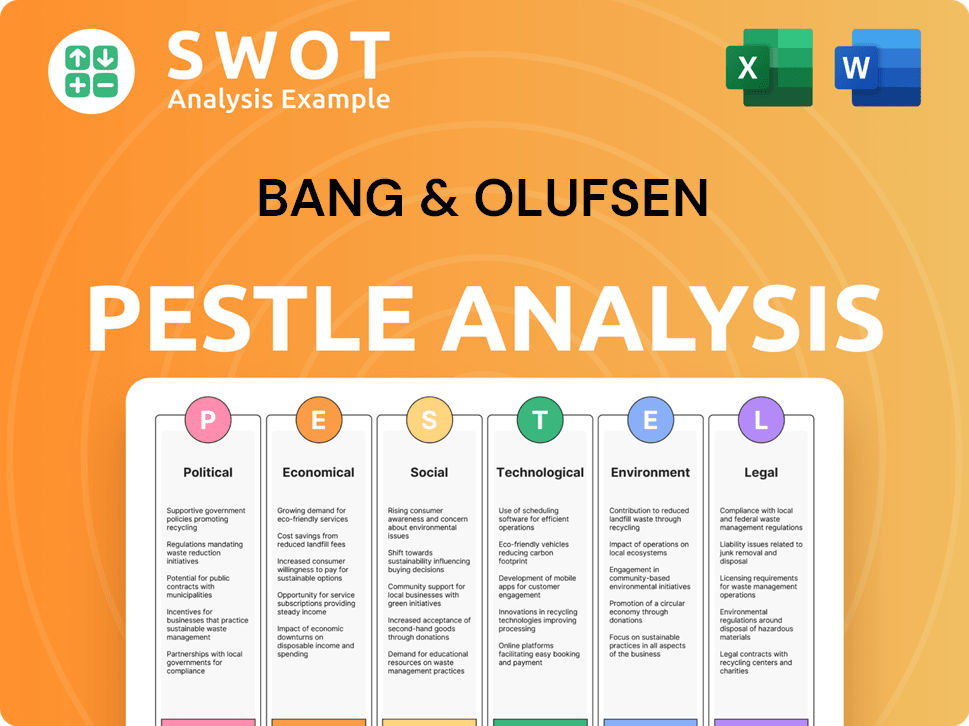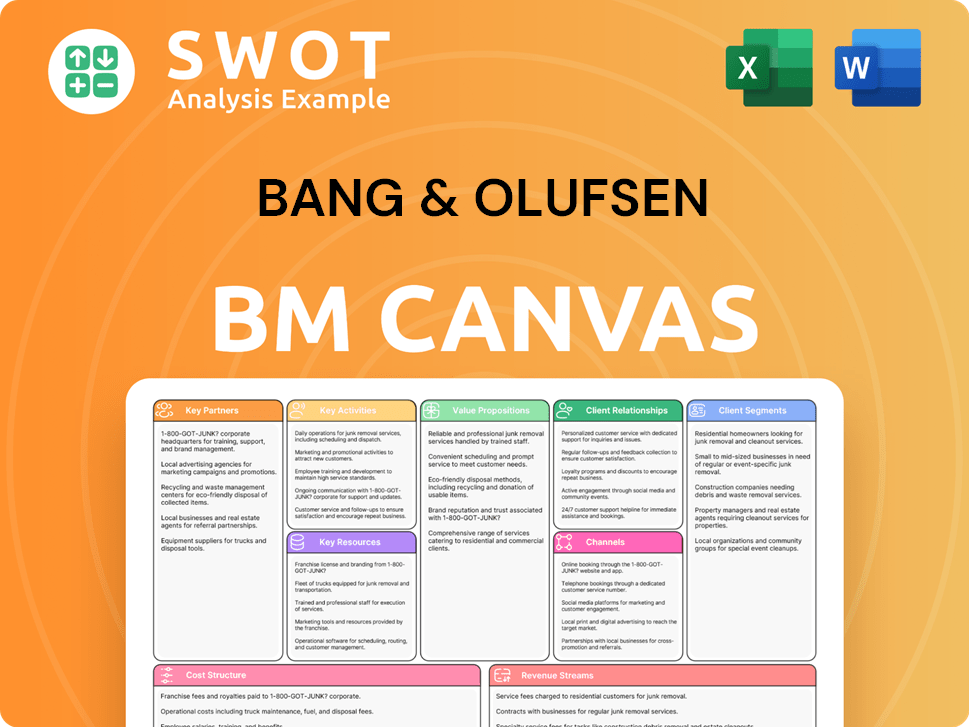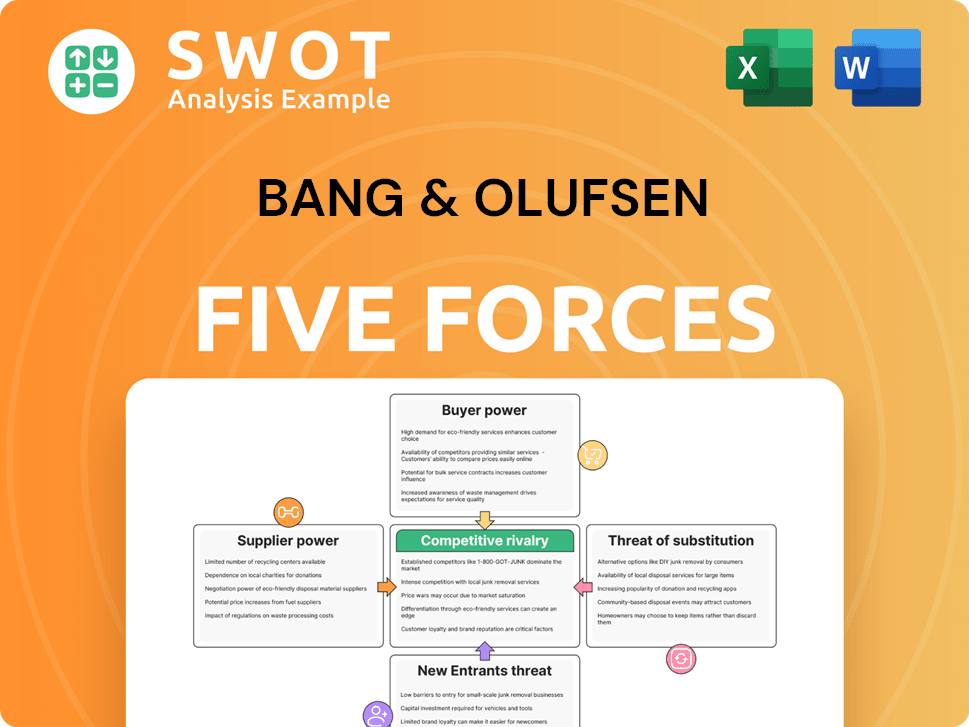Bang & Olufsen Bundle
Who Really Controls Bang & Olufsen?
Understanding the ownership structure of a company is crucial for grasping its strategic direction and market influence. A significant shift in ownership can dramatically reshape a company's future, and this is especially true for a globally recognized brand like Bang & Olufsen, the Danish audio brand. Founded in 1925, B&O has a rich history of innovation.

This exploration into Bang & Olufsen SWOT Analysis will uncover the evolution of its ownership, from its founding to the current landscape. We'll examine key investors, public shareholders, and significant changes over time to provide context for understanding the company's trajectory. Discovering who owns Bang & Olufsen is key to understanding its future. This analysis will help you understand the Bang & Olufsen owner, and the B&O ownership structure.
Who Founded Bang & Olufsen?
The story of the Danish audio brand began on November 17, 1925. It was officially founded by Peter Bang and Svend Olufsen, two young Danish engineers. Their collaboration marked the inception of a company that would become synonymous with innovative audio technology and design.
The founders, Peter Bang and Svend Olufsen, envisioned revolutionizing radio technology. Their primary goal was to develop radios capable of operating directly from alternating current, a significant leap forward from the battery-dependent models of the time. This innovative approach set the stage for their future success.
The initial funding for the B&O history came from family investments. The Olufsen family residence in Struer, Denmark, served as their first laboratory. This intimate setting allowed the founders to nurture their vision and lay the groundwork for a company that would blend technological innovation with distinctive design.
The company was founded on November 17, 1925.
Peter Bang and Svend Olufsen were the founders.
Their initial focus was on innovating radio technology.
Early support came from family investments.
The Bang and Olufsen families maintained full ownership until 1977.
Peter Bang focused on technology, while Svend Olufsen managed the business.
The initial ownership of the Bang & Olufsen company was entirely within the founding families. This structure allowed for a consistent vision and a strong emphasis on quality and design from the outset. The fathers of Peter Bang and Svend Olufsen were the first major shareholders. This family-centric approach shaped the company's culture and its commitment to innovation. The family ownership continued until 1977, when the company began to evolve its ownership structure.
- The company's early years were characterized by family control.
- This structure allowed for a unified vision and strategic direction.
- The founders' families maintained full ownership for over 50 years.
- This ownership model helped establish the brand's core values.
Bang & Olufsen SWOT Analysis
- Complete SWOT Breakdown
- Fully Customizable
- Editable in Excel & Word
- Professional Formatting
- Investor-Ready Format

How Has Bang & Olufsen’s Ownership Changed Over Time?
The evolution of ownership for the Danish audio brand, Bang & Olufsen, has been marked by significant strategic shifts since its inception. Initially a family-owned enterprise, the company transitioned to the public domain in 1977 by listing on the Copenhagen Stock Exchange. This move broadened its investor base, allowing for greater access to capital and a wider global reach. As of June 2025, the market capitalization of Bang & Olufsen A/S is approximately $0.29 billion USD, reflecting its current valuation in the market.
Key events have reshaped the company's ownership landscape. In May 2015, Harman International Industries acquired Bang & Olufsen's automotive audio business for €145 million ($156 million), integrating its high-end audio systems into luxury vehicles. Further restructuring occurred in March 2017, when Tymphany acquired Bang & Olufsen's engineering and manufacturing operations in the Czech Republic. These transactions highlight the company's strategic focus and adaptation to market demands.
| Event | Date | Impact on Ownership |
|---|---|---|
| Initial Public Offering | 1977 | Transition from private to public ownership, listed on Copenhagen Stock Exchange. |
| Automotive Audio Business Acquisition | May 2015 | Harman International Industries acquired the automotive audio division. |
| Czech Republic Operations Acquisition | March 2017 | Tymphany acquired engineering and manufacturing operations. |
| Private Placement of New Shares | November 2024 | Raised DKK 228 million, with new major shareholders emerging. |
Currently, the ownership of Bang & Olufsen is distributed among a mix of institutional and retail investors. While specific percentages for all major institutional investors are not consistently publicly disclosed in real-time, major shareholder announcements indicate shifts. For instance, UBS Group AG's holdings in Bang & Olufsen A/S have fluctuated. In November 2024, Bang & Olufsen completed a private placement of new shares, raising DKK 228 million. This offering involved the issuance of 24,554,416 new shares. Existing and new investors participated, with Dyvig Holdings A/S and Azura Partners Boreale SARL obtaining major shareholder positions exceeding 10% and 5%, respectively. ATP also participated, holding less than 10% after the offering. This capital increase aimed to fund investments for strengthening Bang & Olufsen's position in the luxury audio market. For more insights into the company's strategic direction, consider reading about the Growth Strategy of Bang & Olufsen.
The ownership of Bang & Olufsen has evolved significantly from a family-owned business to a publicly traded company.
- Major acquisitions and strategic decisions have reshaped the company's structure.
- Institutional and retail investors now hold shares, with significant fluctuations in major shareholder holdings.
- Recent capital raises aim to strengthen the company's position in the luxury audio market.
- Understanding the ownership structure provides insight into the company's strategic direction and financial health.
Bang & Olufsen PESTLE Analysis
- Covers All 6 PESTLE Categories
- No Research Needed – Save Hours of Work
- Built by Experts, Trusted by Consultants
- Instant Download, Ready to Use
- 100% Editable, Fully Customizable

Who Sits on Bang & Olufsen’s Board?
As of August 15, 2024, the Board of Directors for the Danish audio brand, Bang & Olufsen, included Juha Christen Christensen as Chair and Albert Bensoussan as Vice Chair. Other members at that time were Jesper Jarlbæk, Anders Colding Friis, Tuula Rytilä, and M. Claire Chung. However, M. Claire Chung stepped down as a director on February 28, 2025. Additionally, Brian Bjørn Hansen, an employee-elected member, stepped down on May 22, 2024, and was succeeded by Andra Gavrilescu.
The composition of the board is crucial for understanding who controls Bang & Olufsen. The board’s decisions significantly influence the strategic direction and financial health of the Bang & Olufsen company. The board is responsible for overseeing the company's operations and ensuring that it is managed effectively. The board also plays a key role in representing the interests of shareholders and stakeholders.
| Board Member | Role | Date of Change |
|---|---|---|
| Juha Christen Christensen | Chair | August 15, 2024 |
| Albert Bensoussan | Vice Chair | August 15, 2024 |
| Jesper Jarlbæk | Board Member | August 15, 2024 |
| Anders Colding Friis | Board Member | August 15, 2024 |
| Tuula Rytilä | Board Member | August 15, 2024 |
| M. Claire Chung | Board Member | Stepped down February 28, 2025 |
| Andra Gavrilescu | Board Member | Succeeded Brian Bjørn Hansen on May 22, 2024 |
Regarding B&O ownership and voting power, Bang & Olufsen operates under a one-share-one-vote principle for its ordinary shares. Following a capital increase, the total number of voting rights in Bang & Olufsen is 147,326,503 as of December 2, 2024. This structure directly links each share to a single vote, which is a key aspect of understanding who owns Bang & Olufsen and how decisions are made within the company. For more insights into the company's background, you can explore the Brief History of Bang & Olufsen.
The voting structure at Bang & Olufsen is straightforward, with each share equating to one vote.
- The total number of voting rights is 147,326,503 as of December 2, 2024.
- The Board of Directors has the authority to manage the company's capital.
- The board can increase share capital and acquire treasury shares, up to 10% of the share capital, until August 14, 2025.
Bang & Olufsen Business Model Canvas
- Complete 9-Block Business Model Canvas
- Effortlessly Communicate Your Business Strategy
- Investor-Ready BMC Format
- 100% Editable and Customizable
- Clear and Structured Layout

What Recent Changes Have Shaped Bang & Olufsen’s Ownership Landscape?
In recent years, the ownership landscape of the Danish audio brand, has seen significant shifts. A key development was the directed share issue in November 2024, which raised DKK 228 million. This capital injection, involving the issuance of over 24 million new shares, aimed to bolster the company's position in the luxury audio market. Dyvig Holdings A/S and Azura Partners Boreale SARL emerged as major shareholders, influencing the evolution of the company's ownership structure.
Share buyback programs have also played a role in shaping the ownership profile. For instance, a program was initiated in April 2024, with a maximum value of DKK 1,000 million, or up to 1,700,000 shares, which ran until July 2024. Leadership changes, such as the departure of Brian Bjørn Hansen and M. Claire Chung from the Board of Directors, further reflect the dynamic nature of who owns Bang & Olufsen.
| Key Development | Details | Impact on Ownership |
|---|---|---|
| Directed Share Issue (Nov 2024) | Raised DKK 228 million through new shares | Increased stake for Dyvig Holdings A/S and Azura Partners Boreale SARL |
| Share Buyback Program (Apr-Jul 2024) | Up to DKK 1,000 million or 1,700,000 shares | Potential shift in ownership distribution |
| Board of Directors Changes | Departures of Brian Bjørn Hansen and M. Claire Chung | Reflects evolving corporate governance |
Industry trends indicate a rise in institutional ownership, which is mirrored in the company's shareholder base. The fluctuations in UBS Group AG's stake, crossing the 5% threshold multiple times, highlight the dynamic nature of B&O ownership. The company's financial guidance for the 2024/25 fiscal year, with anticipated revenue growth between -3% to 3% and an EBIT margin before special items between -2% and 1%, along with its long-term goals, demonstrates a strategic focus on profitable growth. To understand the company's target audience, check out this article: Target Market of Bang & Olufsen.
Currently, the ownership structure includes institutional investors and major shareholders. The company's ownership is influenced by share issuances and buyback programs.
The ownership is subject to changes due to institutional investments and share transactions. Major shareholders and their stakes can fluctuate over time.
Dyvig Holdings A/S and Azura Partners Boreale SARL are among the major shareholders. Institutional investors also hold significant stakes in the company.
The financial performance and strategic goals impact the ownership landscape. The company aims for an 8% CAGR in revenue growth by fiscal year 2027/28.
Bang & Olufsen Porter's Five Forces Analysis
- Covers All 5 Competitive Forces in Detail
- Structured for Consultants, Students, and Founders
- 100% Editable in Microsoft Word & Excel
- Instant Digital Download – Use Immediately
- Compatible with Mac & PC – Fully Unlocked

Related Blogs
- What are Mission Vision & Core Values of Bang & Olufsen Company?
- What is Competitive Landscape of Bang & Olufsen Company?
- What is Growth Strategy and Future Prospects of Bang & Olufsen Company?
- How Does Bang & Olufsen Company Work?
- What is Sales and Marketing Strategy of Bang & Olufsen Company?
- What is Brief History of Bang & Olufsen Company?
- What is Customer Demographics and Target Market of Bang & Olufsen Company?
Disclaimer
All information, articles, and product details provided on this website are for general informational and educational purposes only. We do not claim any ownership over, nor do we intend to infringe upon, any trademarks, copyrights, logos, brand names, or other intellectual property mentioned or depicted on this site. Such intellectual property remains the property of its respective owners, and any references here are made solely for identification or informational purposes, without implying any affiliation, endorsement, or partnership.
We make no representations or warranties, express or implied, regarding the accuracy, completeness, or suitability of any content or products presented. Nothing on this website should be construed as legal, tax, investment, financial, medical, or other professional advice. In addition, no part of this site—including articles or product references—constitutes a solicitation, recommendation, endorsement, advertisement, or offer to buy or sell any securities, franchises, or other financial instruments, particularly in jurisdictions where such activity would be unlawful.
All content is of a general nature and may not address the specific circumstances of any individual or entity. It is not a substitute for professional advice or services. Any actions you take based on the information provided here are strictly at your own risk. You accept full responsibility for any decisions or outcomes arising from your use of this website and agree to release us from any liability in connection with your use of, or reliance upon, the content or products found herein.